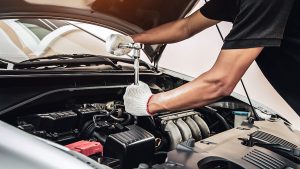In the realm of automotive emergencies, a blown motor ranks high on the dread scale. It’s a sudden, catastrophic failure that can leave you stranded with a hefty repair bill. However, understanding the causes and methods of engine repair can empower you to tackle this daunting task.

Image: www.cashcarsbuyer.com
A blown motor, also known as a catastrophic engine failure, occurs when internal components within the engine sustain severe damage. This damage can result from various factors, including extreme heat, lack of lubrication, detonation, or hydrolocking. The most common symptom is an immediate loss of engine power, often accompanied by strange noises, smoke, or fluid leaks.
Diagnosing the Problem
Accurately diagnosing a blown motor is crucial before attempting repairs. Here are some common signs to watch out for:
- Complete loss of engine power: If your engine abruptly stops running and refuses to start, it could indicate a catastrophic failure.
- Knocking or banging sounds: Loud, rhythmic noises inside the engine may suggest broken or damaged internal components.
- Excessive smoke from the exhaust: Thick black or blue smoke pouring out of the tailpipe can be a sign of severe engine damage.
- Leaking fluids: If you notice oil, coolant, or other fluids dripping beneath your car, it could indicate a breached engine block or other critical components.
Essential Tools and Equipment
Fixing a blown motor requires a comprehensive set of tools, including:
- Wrenches of various sizes
- Ratchet and socket set
- Torque wrench
- Pliers
- Screwdrivers
- Engine hoist
- Engine stand
- Replacement engine or parts
Step-by-Step Repair Process
While repairing a blown motor can be demanding, following a meticulous step-by-step process can increase your chances of success:
- Safety First: Disconnect the battery and allow the engine to cool before attempting any repairs.
- Engine Removal: Carefully remove the engine from the vehicle using an engine hoist.
- Disassembly: Disassemble the engine into its individual components, including the cylinder head, pistons, crankshaft, and camshaft.
- Inspection: Thoroughly inspect each component for damage, wear, or breakage. Replace worn or damaged parts as necessary.
- Reassembly: Assemble the engine by reversing the disassembly process. Ensure all components are properly aligned and tightened to specifications.
- Engine Installation: Reinstall the engine into the vehicle using the engine hoist.
- Fluid Replacement: Fill the engine with new oil, coolant, and other fluids as per the manufacturer’s recommendations.
- Testing: Start the engine and allow it to run for a short period. Monitor for any unusual noises, vibrations, or fluid leaks.

Image: www.youtube.com
Expert Insights and Actionable Tips
To enhance your chances of a successful repair, consider these expert insights:
- Seek Professional Help: If you lack experience in engine repair, it’s advisable to seek assistance from a qualified mechanic. A professional can provide valuable guidance and assist with complex tasks.
- Use High-Quality Parts: When replacing damaged components, opt for high-quality parts that meet or exceed the original equipment specifications.
- Follow Manufacturer’s Instructions: Refer to the vehicle’s service manual for detailed repair procedures and torque specifications.
How To Fix A Blown Motor
Conclusion
Repairing a blown motor is not for the faint of heart. However, by understanding the causes, diagnosis, and step-by-step repair process, you can significantly increase your chances of restoring your engine to its former glory. Remember, proper maintenance, including regular oil changes and fluid inspections, can prevent engine failures and extend the life of your vehicle.